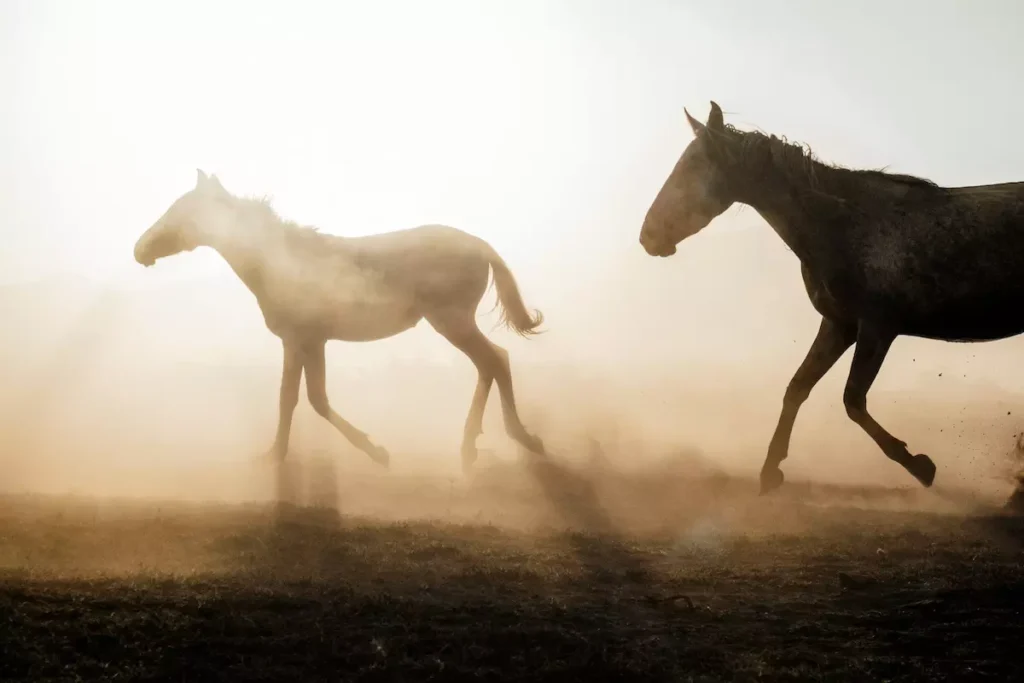Wild horses bring ecological services and economic boon to North Dakota.
Washington, D.C. — Animal Wellness Action is renewing its call to the National Park Service (NPS) in a letter sent today to Director Charles Sams, to scuttle its plans to remove free-roaming wild horses from the Theodore Roosevelt National Park (TRNP).
Animal Wellness Action and its partner organizations, the Center for a Humane Economy and Animal Wellness Foundation, are adding their voices to the chorus of North Dakota public officials, citizens, and organizations, along with national equine protection organizations, underscoring that the free-roaming horses play a beneficial role in maintaining the park’s grassland ecology and are widely recognized as an engine of economic development for the park’s gateway communities.

“The National Park Service is being robotic and reflexive in wanting to depopulate horses from an area that has had large mammals on the landscape for tens of thousands of years,” said Wayne Pacelle, president of Animal Wellness Action and the Center for a Humane Economy. “So many North Dakotans are rightfully appalled by this scheme, noting that the wild horses provide beneficial ecological services and are also a key draw for thousands of visitors who drive millions in economic activity to gateway communities in the rural reaches of the state.”
There are fewer than 200 wild horses in the 70,000-acre park. If future population control is a core NPS objective, it can be achieved by the application of fertility control rather than physical removal. Fertility control is already widely used by NPS, the Bureau of Land Management, and other Interior Department land and wildlife management agencies.
According to Dr. Ross MacPhee, the Director of Science at Rewilding America Now and an emeritus Curator of Vertebrate Zoology at the American Museum of Natural History, modern domesticated horses descend from a uniquely North American branch of equids and these large-bodied, bulk-feeding mammals are critically important for maintaining or improving grassland health.
“Removing wild horses from TRNP is a grave mistake for many reasons, but depriving the park of one of its last natural megafaunal engineers is among the least forward-thinking of the ideas now being considered for the park’s future direction,” Dr. MacPhee emphasized.
The proposed options vary from reducing the herd to only 35-60 horses, which requires the removal of about 150 horses, to accelerating the reduction of the herd to zero wild horses through a phased-in approach. Animal Wellness Action and the Center recommend no removal of the wild horses, with fertility control employed in future years if scientists determine, in the unlikeliest of cases, that these landscape engineers cause any adverse ecological problems.
There were 19,000 public comments submitted during the scoping period on the September 2023 Livestock Plan Environmental Assessment, with the vast majority favoring continued protection of the horses and maintaining their robust presence within the national park.
The agency has thus far looked askance at the urgings of North Dakota Governor Doug Burgum and state and federal lawmakers from The Peace Garden State to support the preservation of the wild horse herd and to allow it to remain intact.
Only if warranted, NPS can employ fertility control programs using PZP, a proven and safe method with a 40-year history. This approach, properly applied, can safeguard the reproductive health of the herd while preserving genetic diversity. The NPS must prioritize the welfare of these horses and their historical and cultural significance to North Dakota.
“These horses have cultural and ecological value for Theodore Roosevelt National Park, and it’s time for the National Park Service to turn off the auto-pilot function when it comes to ‘invasive species’ and listen to the wide range of ecologists and other key stakeholders who have a superior plan for wildlife management in the park,” added Pacelle.

